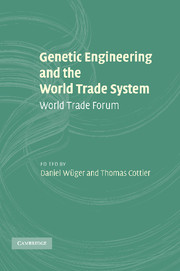Book contents
- Frontmatter
- Contents
- List of contributors
- List of abbreviations
- PART I Introduction and systemic issues
- PART II Intellectual property and gene technology: issues at stake and possible options
- PART III Food security, trade and agricultural production with genetically modified organisms
- PART IV Food safety, international trade and biotechnology
- PART V Medical research, cloning and international trade
- 12 Genetic engineering, free trade and human rights: global standards and local ethics
- 13 The regulation of human genetics by international soft law and international trade
- Index
12 - Genetic engineering, free trade and human rights: global standards and local ethics
Published online by Cambridge University Press: 06 October 2009
- Frontmatter
- Contents
- List of contributors
- List of abbreviations
- PART I Introduction and systemic issues
- PART II Intellectual property and gene technology: issues at stake and possible options
- PART III Food security, trade and agricultural production with genetically modified organisms
- PART IV Food safety, international trade and biotechnology
- PART V Medical research, cloning and international trade
- 12 Genetic engineering, free trade and human rights: global standards and local ethics
- 13 The regulation of human genetics by international soft law and international trade
- Index
Summary
Introduction
The process of globalisation encourages an international commitment to the principle of free trade (in the sense of facilitating market access in relation to both goods and services) coupled with respect for human rights and human dignity. According to some, the international community is doing rather better at globalising free trade than it is at globalising justice and human rights – and, indeed, so long as international institutional missions are centred on free trade objectives, some would see a certain inevitability in this uneven process. Nevertheless, the dual commitment (to market access and to respect for human rights) sets the international global agenda – or, at any rate, two starred items on that agenda.
Free trade is neither an end in itself nor a strategy to be pursued at all costs. It is not the former because its appeal rests on the judgment that this is the economic default position most likely to promote human welfare; hence, if the default position does not function as intended – and this is a matter to be kept under constant review – then we need to find another way of promoting human welfare. Neither is free trade a strategy to be pursued at all costs, for measures designed to maximise aggregate human well-being must always be compatible with respect for human rights and human dignity.
- Type
- Chapter
- Information
- Genetic Engineering and the World Trade SystemWorld Trade Forum, pp. 287 - 314Publisher: Cambridge University PressPrint publication year: 2008
- 2
- Cited by



